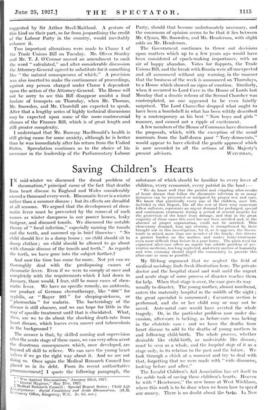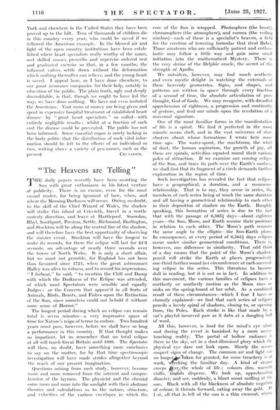Saving Children's Hearts
IN mid-winter we discussed the dread problem of -I- rheumatism,* principal cause of the fact that deaths from heart disease in England and Wales considerably exceed a thousand every week. Rheumatic fever is a winter rather than a summer disease ; but its effects are dreadful at all seasons. We argued that the development of rheu- matic fever must be prevented by the removal of such causes as winter dampness in our poorer houses, leaky footgear, and diseased tonsils. We discussed the notable theory of " focal infection," especially naming the tonsils and the teeth, and summed up in brief thuswise : " No child should live in a damp house ; no child should sit in damp clothes ; no child should be allowed to go about with chronic disease of the tonsils and teeth." As regards the teeth, we have gone into the subject further.t And now the time has come for more. Not yet can we thoroughly deal with the predisposing causes of rheumatic fever. Even if we were to comply at once and completely with the requirements which I laid down in January, there would, I fear, still be many cases of rheu- matic feVer. We have no specific remedy, no antitoxin, nor product of German chemotherapy, like " 606 " for syphilis, • or " Bayer 205 " for sleeping-sickness, or plasmochin " for malaria. The bacteriology of the disease is still obscure, and we can hope for little in the Way of specific treatment until that is elucidated. What, then, are we to do about the shocking death-rate from heart disease, which leaves .even cancer and tuberculosis in the background ?
The answer is that, by skilled nursing and supervision after the acute stage of these cases, we can very often avert the disastrous consequences which, once developed, are beyond all skill to relieve. We can save the young heart valves if we go the right way about it. And we are not doing so. Once again the Medical Research Council has Placed us in its debt. From its recent authoritative , Pranouricementt I quote the following paragraph, the
* " War Against Rheumatism," January 22nd, 1927. t "Dental Hygiene," May 21st, 1927.
Medical Research Council : Special Report Series Child Life "eatigalioria: Social Condition* and Acute, Rheumatism. (H.M. 8"aione Office, Kngsway, W.C.
2s. 6d. net.)
substance of which should be familiar to every lover of children, every economist, every patriot in the land :- " Wo do know well that the painful and crippling after-results of heart disease that follow the rheumatic infection in so many instances can be prevented or mitigated by proper rest and care. We know that practically every one of the children, over 700, included in this Report, like all the rest of their very numerous follow sufferers, represents an urgent demand for prolonged, special and continuous treatment during a period of several months for the protection of the heart from damage, and that in the great majority of these cases this need has not been satisfied and, in the absence of proper organisation, could not be satisfied. This elementary demand, long ago obvious, is strengthened by facts brought out in this investigation, for if, as it appears, Cho disease tends to attack more than one member of the family, this throws a greater burden on the mother, and makes home-treatment even more difficult than before in a poor home. The plain need for organised after-care offers an urgent but soluble problem of pre- ventive medicine, too long neglected, and every motive of humanity and wise economy should impel the community to provide this after-care as soon as possible."
My lifelong argument that we neglect the field of medical sociology finds fresh illustration here. The private doctor and the hospital stand and wait until the urgent and acute stage of some process of disaster reaches them for help. When that stage is over, the case goes its way usually to disaster. The young mother, almost moribund, enters the maternity .hospital in the middle of the night ; the great specialist is summoned ; Caesarean section is performed, and she or her child may or may not be saved. Ante-natal care would have averted the whole tragedy. Or, in the particular problem now under dis- cussion, after-care is lacking, as before-care was lacking in the obstetric case : and we have the deaths from heart disease to add to the deaths of young mothers in and following child-birth. The whole process, whether desirable like child-birth, or undesirable like disease, must be seen as a whole, and the hospital stage of it as a stage only, in its relation to the past and the future. We look through a chink at a moment and try to deal with that, forgetting that we were made with "wide discourse, looking before and after."
The Invalid Children's Aid Association has set itself to the noble task of saving these children's hearts. Heaven be with " Heartsease," the new home at West Wickham, where this work is to be done when we learn how to spend our money. There is no doubt about ths Ratite- Tu New York and elsewhere in the United States they have been proved up to the hilt. Tens of thousands of children die in this country every year, who could be saved if we followed the American example. In the blessed air and light of the open country institutions have been estab- lished where heart specialists really worthy of the name, and skilled nurses, prescribe and supervise ordered rest and graduated exercise so that, in a few months, the inflamed valves settle down without the deformation • which nothing thereafter can relieve, and the young heart is saved. I appeal here, as I have done elsewhere, to our great insurance companies for their help, notably in education of the public. The plain truth, ugly and deeply discreditable, is that, though we ought to have led the way, we have done nothing. We have not even imitated the Americans. Vast sums of money are being given and spent in expensive hospital treatment of established heart 'disease—by " great heart specialists " so called—with entirely negligible results : whilst at a fraction of such cost the disease could be prevented. The public has not been informed. Some essential organ is surely lacking in the body politic that the distribution of such vital infor- mation should be left to the efforts of an individual or two, writing above a variety of pen-names, such as the















































 Previous page
Previous page